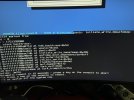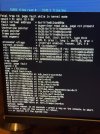I'm trying to install FreeBSD with UFS on my computer, but it keeps kernel panicking (usually around extracting src.txz, but it sometimes crashes before or after).
I ran a memory test and it passed normally; I could also install/run Linux just fine. I've tried the installers for FreeBSD 13.5, 14.2 and 14.3 - none of them worked.
PC: GMKtec NucBox G3
CPU: Intel N100
RAM: 16GB
I ran a memory test and it passed normally; I could also install/run Linux just fine. I've tried the installers for FreeBSD 13.5, 14.2 and 14.3 - none of them worked.
PC: GMKtec NucBox G3
CPU: Intel N100
RAM: 16GB


